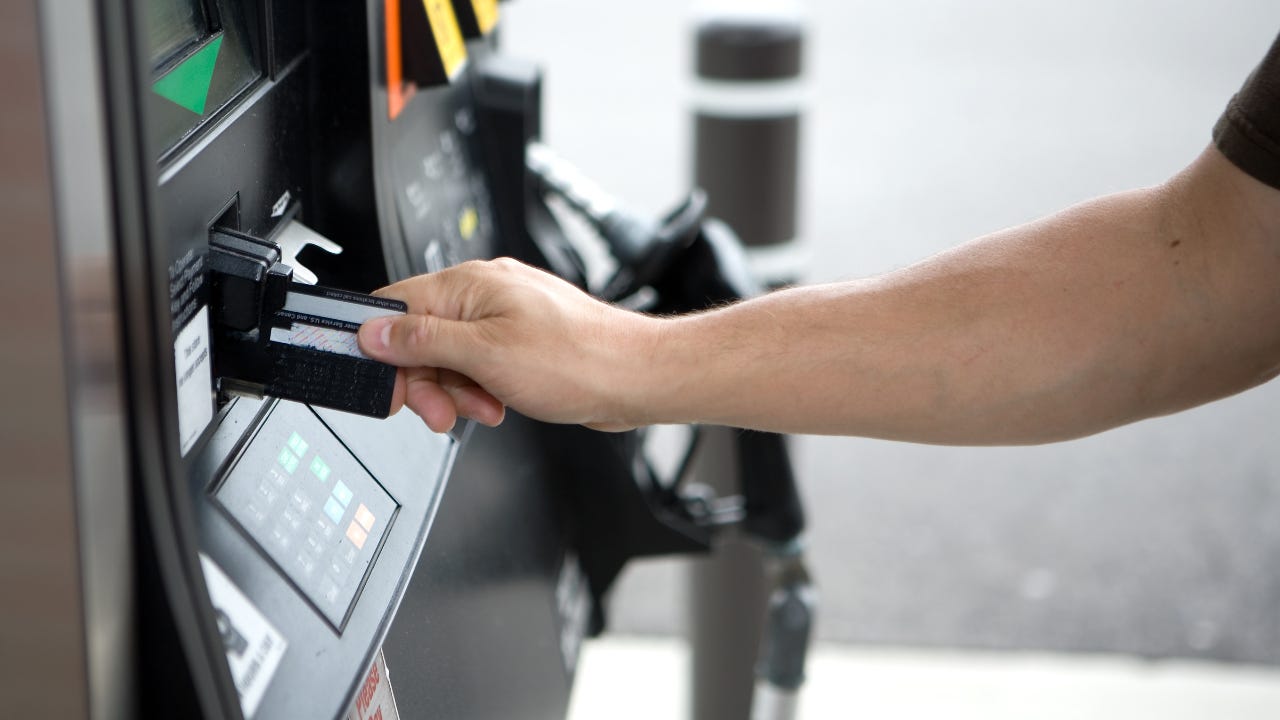Guide to fleet fuel cards for business

Key takeaways
- Fleet fuel cards are specialized credit cards designed for businesses to manage and track their fuel and vehicle maintenance expenses.
- Different fleet cards offer various benefits, including rewards, fuel discounts and analytics for tracking vehicle movements and expenses.
- Businesses can choose a card based on fleet size and typical locations where their vehicles refuel.
- Fleet cards offer other benefits like fraud loss coverage, business identity protection and roadside assistance.
- If fuel and vehicle costs represent only a small part of a business’s expenses, a traditional business credit card might be a more suitable option.
Businesses in the shipping and transportation industries can spend a lot of money on gas — and they’re not the only ones. Any company with delivery drivers does this, as well as businesses that work in certain tourism sectors. Limo services and companies that provide airport transfers are excellent examples.
Fleet fuel cards, sometimes just called fuel cards, offer a solution for businesses that spend a significant amount on gas. These cards not only make it convenient for employees to pay for gas purchases, but also track expenses and generate spending reports.
If your business spends a lot on gas, and you want to make it easier to track and budget for those expenses, signing up for a fleet card could be the right move.
What are fleet cards?
Fleet fuel cards are commercial products — often branded by gas companies — that act as business credit cards or charge cards. Companies can use them to purchase fuel and maintenance for their fleet of vehicles by giving cards to their drivers, who in turn use them for all fleet-related purchases. Once a company signs up for fleet cards, its employees can buy from the card’s network of gas stations and merchants to fuel up and take care of vehicles on the road.
As employees use their credit cards to pay for gas and other authorized purchases, the employer can also monitor and oversee purchases in real-time.
How do fleet credit cards work?
Fleet fuel cards typically work like any other business credit card. Once you’ve been approved for the card you want, you give one to each of your employees so they’re all connected to the same company account. Then, your employees make fleet-related purchases with the card as they work.
As the main account holder, you’re responsible for paying off the card at the end of each billing cycle, just like a regular credit card. If your fuel card is more like a charge card, then you won’t have the option to carry a balance — you’ll have to pay in full every month.
As a business owner, you’d likely sign up for fleet fuel cards if you want to get more organized with your expenses while saving money on gas and maintenance. Applying for fleet fuel cards can help you avoid manually keeping track of gas and maintenance purchases by various employees.
Fleet fuel cards come with expense tracking and reporting functions, so you can see all the purchases your workers make on the road. Fleet fuel cards also let employers set up alerts that might let them know about fraud or misuse right away. Many of these cards also come with additional incentives that can help you save money, such as fuel discounts or rewards.
Who can get a fleet fuel card?
Fleet fuel cards are for businesses only, meaning that individual consumers cannot sign up for these products. Individuals probably wouldn’t want to anyway, given that these cards are geared toward companies who need to oversee and manage gas purchases and vehicle maintenance across an entire fleet.
An individual who works as a freelancer within the shipping or transportation industry wouldn’t need complex tools to keep track of their own spending and maintenance of a single vehicle.
Plus, there are plenty of credit cards that let consumers earn rewards on gas purchases. Many of the best gas credit cards for individuals and businesses also come with no annual fee.
Fleet fuel card benefits
Depending on which fleet fuel card you sign up for, you can take advantage of multiple perks, including:
- Rewards programs. Most cards offer discounts or rewards points for hitting certain gas usage thresholds or using in-network gas stations and maintenance companies.
- Purchase authorization power. Business owners who sign up for fleet fuel cards have the option to determine which purchases to authorize. Some fleet fuel cards are only for gas and maintenance, while others let employee cardholders pay for purchases in gas station convenience stores. This can be a nice feature if you want to cover drinks or snacks for your employees on the road.
- Expense tracking tools. Fleet fuel cards help business owners track and minimize their transportation-related expenses. It’s easy to imagine how signing up for a traditional business credit card without robust purchase tracking features could create a headache for whoever has to reconcile all purchases made by every employee.
- Employee organization tools. Because fleet fuel cards are typically tied to each individual employee or vehicle, who often then have to enter a PIN at the pump, you’ll know exactly who’s making purchases, as well as when and where they’re happening.
- Purchase alerts. If one of your employees is consistently making more purchases than usual, the reporting feature of these cards can alert you to this behavior.
- Long-term reporting tools. Not only do these cards help with short-term budgeting, but most fleet fuel cards come with tools that business owners can use to monitor expenses for the long haul (no pun intended). You can use this data for important business-related decisions, as well as to save you time and energy when it comes time to file your taxes each year.
Best fleet fuel cards
The best fleet fuel cards let you gain valuable benefits when your employees fuel up. If you want to streamline gas purchases and tracking for your business, consider the following card options for your fleet:
Axle Fuel Card
-
The Axle Fuel Card™ is made for mixed-fuel fleets that use the Pilot Flying J and One9 Fuel Network to fill up on fuel. This card is available for fleets of all sizes.
Fuelman Card
-
Fuelman has three credit cards: the Fuelman Diesel Fleet Card and Fuelman Mixed Fleet Card, which get discounts at over 40,000 service stations in the discount network, and the Fuelman Mastercard® that’s valid anywhere Mastercard is accepted in the U.S.
WEX Fleet Cards
-
WEX offers specialized fleet cards for small businesses, large fleets and fleets managed by the government. Many of their cards are also branded in partnership with companies like 7-Eleven and CITGO, so you can choose a card based on where your fleet typically fills up.
ExxonMobil BusinessPro
-
This card can be used for a variety of fleet types. If your business fuels up at Exxon and Mobil stations, the ExxonMobil™ BusinessPro™ could suit your needs.
The BP Business Solutions Program
-
The BP Business Solutions Program includes two different fleet fuel cards to choose from — the BP Business Solutions Fuel Plus for small to mid-sized fleets that only plan to use BP or Amoco for their fueling needs, and the BP Business Solutions Mastercard for mid-sized to large fleets who want to use their card to fuel up anywhere Mastercard is accepted in the U.S.
Shell Card
-
This card isn’t geared toward one specific type of fleet and is versatile enough to work for many.
The bottom line
Many fleet cards operate within a specific network of gas stations and maintenance shops. Other fleet fuel cards are usable within a specific network of service stations nationwide or for a specific brand of fuel.
Fleet fuel cards offer numerous benefits that can make them valuable for any business, although perks vary widely from card to card. If fuel and vehicle expenses are only a small part of your business, and you have no need for extra tracking tools, consider a more traditional business credit card with gas perks.
As you decide whether to use fleet fuel cards for your business, additional benefits you can look for include fraud loss coverage, business identity protection and roadside assistance.
Information about the BP Business Solutions Mastercard, BP Business Solutions Fuel Plus, Axle Fuel Card™, Fuelman Card, ExxonMobil™ BusinessPro™ Shell Card Business and Shell Card Business Flex™ has been collected independently by Bankrate. Card details have not been reviewed or approved by the card issuer.
Why we ask for feedback Your feedback helps us improve our content and services. It takes less than a minute to complete.
Your responses are anonymous and will only be used for improving our website.
You may also like






